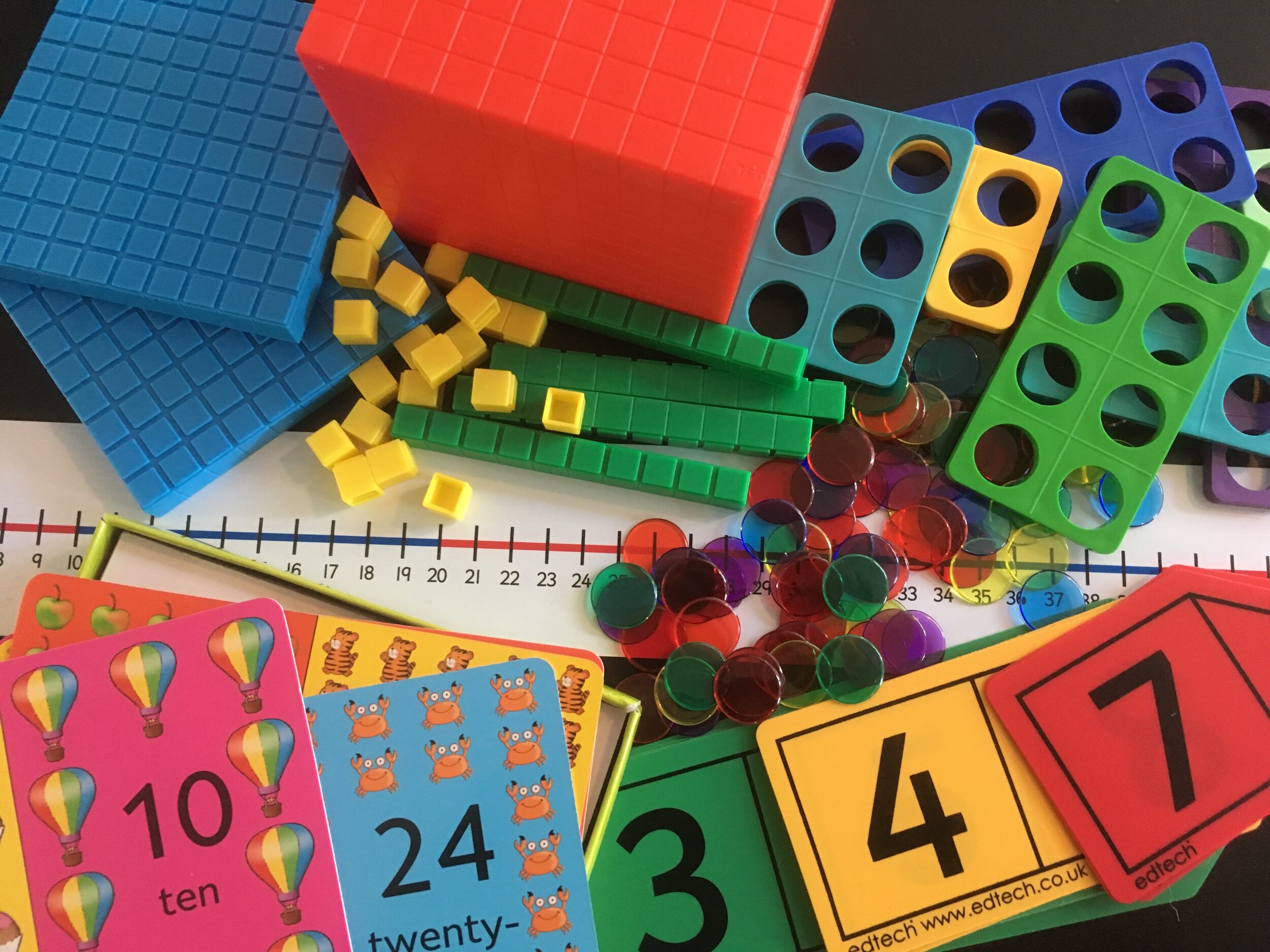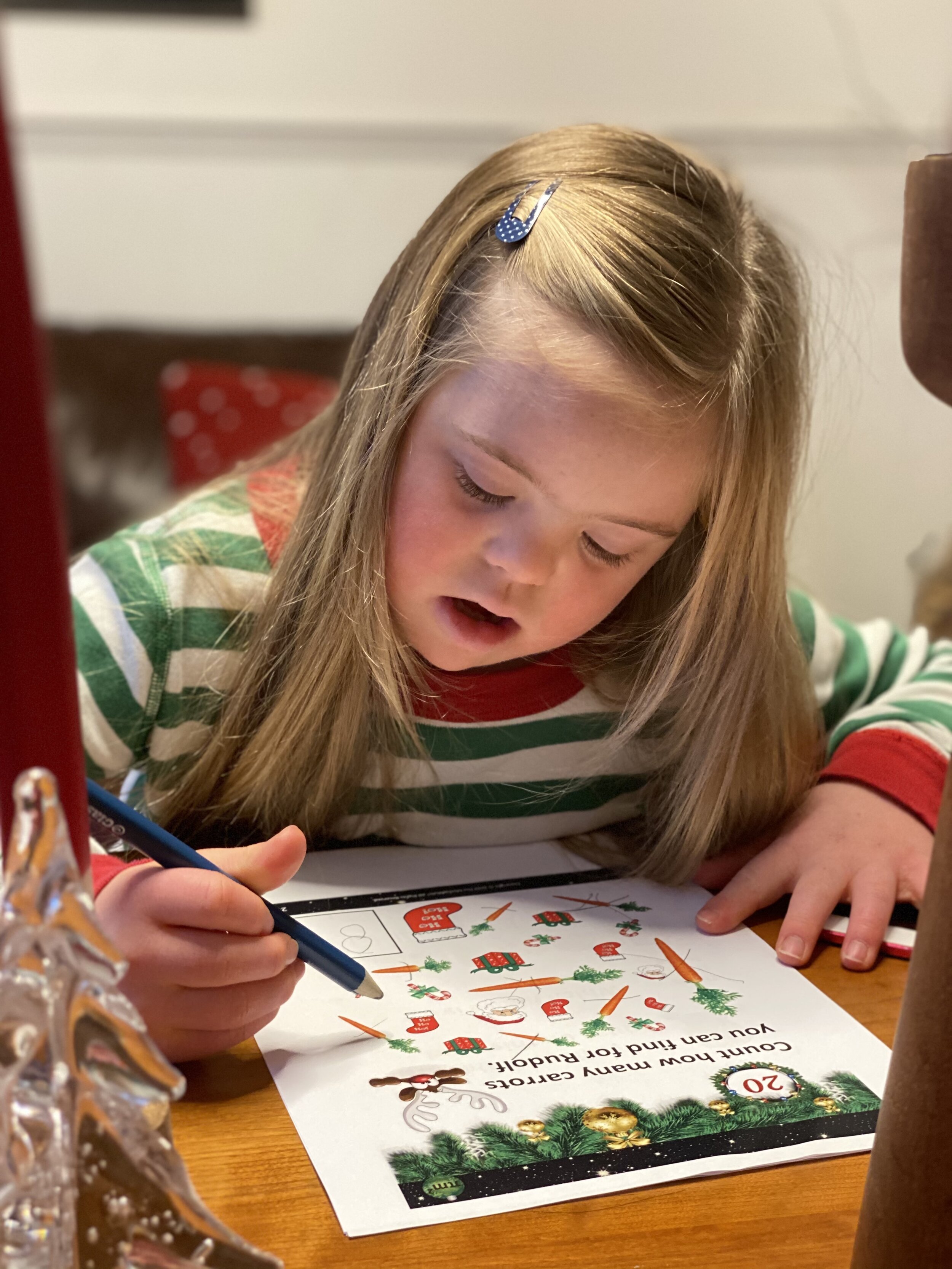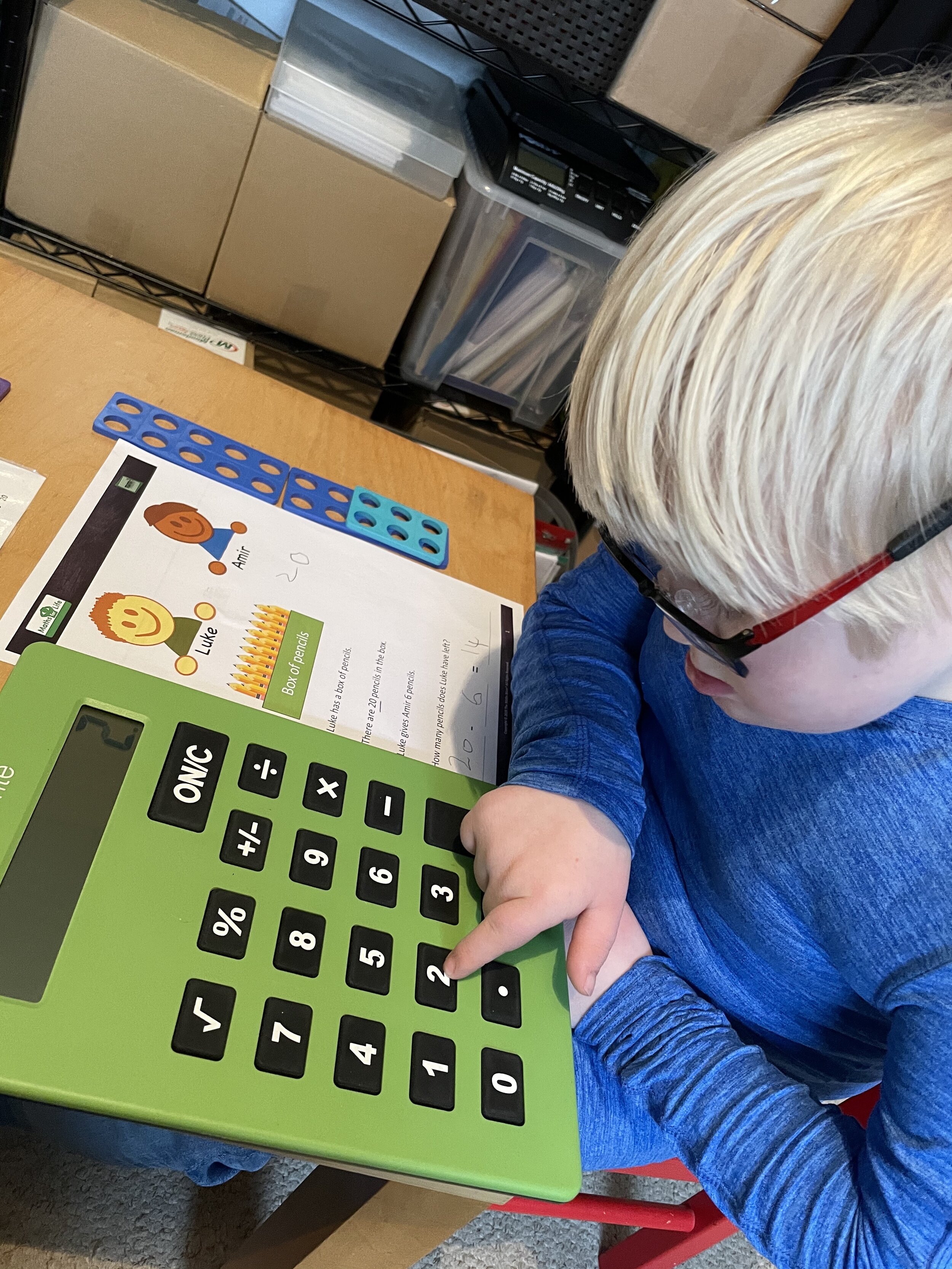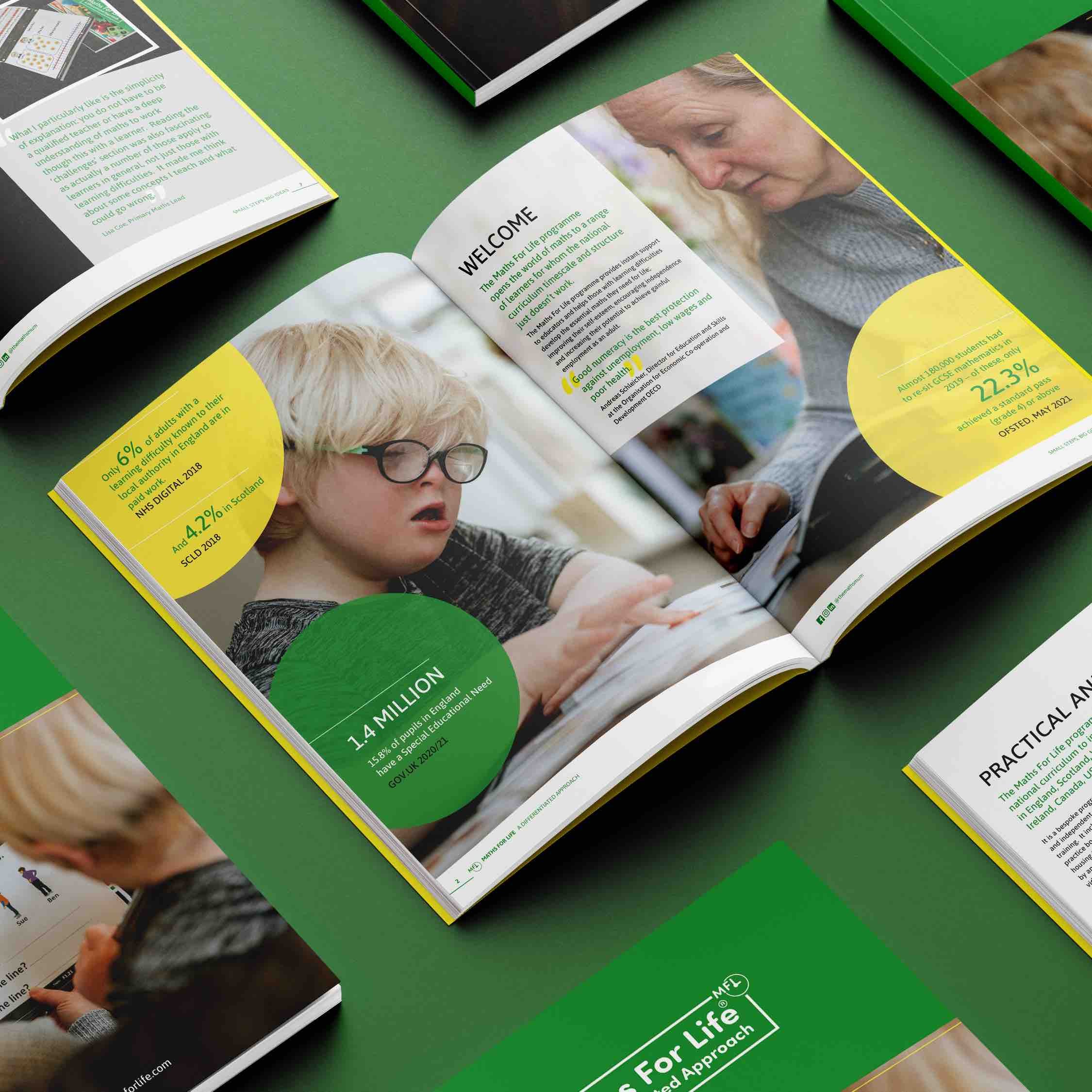Teaching / Learning Skills Assistants the Maths For Life programme:
HELPS break down each maths milestone into understandable, relatable and teachable chunks.
ENABLES time to be focused on teaching, rather than preparation, by providing a comprehensive and varied list of options to support repetition whilst avoiding boredom.
SUPPORTS the ‘little and often’ approach that tends to work well for students with additional learning difficulties.
The Maths For Life programme consists of three elements:
Read more about the Maths For Life programme below or visit the FAQs page, where we have a series of video responses.
The Programme
Unlike English, spellings, PE and art, it can be really difficult to differentiate a maths topic and to think of another way to approach a learning objective when faced with a student saying ‘NO!’ at the top of their vocal range. The art of keeping a student focused is engaging on the correct level, adjusting difficulty up and down seamlessly whilst having several alternatives up your sleeve. All this takes preparation, which tends not to be scheduled into the daily timetable.
The Maths For Life programme offers you a comprehensive, clear and varied list of options for every incremental, micro step in maths development. The textbooks are the guide and subscription based membership provides supporting workbooks, templates and resources. It is designed to help you, streamline the preparation time needed and have a stock of ideas in reserve.
Different to typically developing individuals, the majority of students with additional learning needs have to be implicitly taught every step and they take longer to ‘secure’ the objective. They will not move as quickly through the curriculum and therefore it is essential to be able to repeat the same learning in a variety of different ways, to avoid boredom and maintain a positive relationship with maths.
It is important to check that a student has all the building blocks in place to be able to tackle an objective or indeed understand what aspect they will need support with to find the balance and maintain an errorless learning approach. Errorless learning involves early and immediate prompting of the target, so that a student’s response is sure to be correct - for example, ‘Which car is big?...’ whilst holding up two cars but having the big car closer to the child or move it towards the student should they look to be moving toward the small car. Immediate prompts guarantee success and willingness to try again. Once a student is familiar with the activity, prompting can be reduced and the student will be able to respond correctly on their own.
The educator guides pull together lots of ideas and known challenges for you to reference. The key to success is being able to understand the connections between topics and how to target multiple objectives in one activity or with one set of maths aids. This can maximise a student’s attention and is an efficient use of time. For example, you can use four regular dice to look at subitising, identifying the same and different, counting and sequencing forwards and backwards, as well as placing them in different positional places for the student to find. This covers multiple objectives in one lesson. ‘Little and often’ will enable a student with additional learning needs the opportunity to move the learning from short term to long term ‘secured’ memory. As the milestones are broken down into incremental, micro steps on the Record of Progress, it will help you demonstrate a student’s progress term to term, year to year.
Although the Maths For Life programme was born out of a specific project to address the needs of students with Down syndrome, it has been recognised and evidenced as applicable to all individuals with additional learning needs.
Oxfordshire County Council were impressed by the results of a parent-led Maths For Life pilot commissioned by and involving students from the Oxfordshire charity, Down’s Syndrome Oxford. Given the effectiveness of the programme for students with Down syndrome, the Head of SEND at the council asked the question, “Will the Maths For Life programme work for all students with SEND?”. The conclusion of the 2023/24 academic year pilot study sponsored by council was a resounding ”Yes” - 93% of students increased their overall maths attainment. The results of the pilot provide compelling evidence of how the Maths For Life programme can benefit a wide range of students with SEND and the staff supporting them. The pilot report, available here, details the positive impact not only on maths attainment, but also in the wider context, including independence, self-esteem and reading.
“The launch event generated much excitement countywide for what the programme might achieve and, through dedication from schools and incredible support from the Maths For Life team, the pilot has exceeded expectations.” - Nicky Ashby-Guest, Oxfordshire County Council
30% of the Oxfordshire County Council pilot population were autistic students. The results demonstrate that autistic students improved more in overall average attainment than the overall sample population. Staff supporting these students identified that 81% of them improved their engagement in learning maths.
“I am the Lead teacher for Maths in our SEN school across ages 5-16. Our school is mixed SEN needs and many of our children are autistic. I also have a MEd in Autism, so maths and autism are my areas of knowledge. I have found the Maths For Life programme to be very successful and we have been using it for a couple of years with all of our children. In my own class, I find my autistic students love the predictability of the worksheets and style of questions. This has helped them to become more independent with their work, knowing what they need to do.” - Jana-liss Richardson, Maths Lead, Ellesmere College
The Maths For Life programme can benefit all students, with or without an additional learning need, who struggle with maths, improving their self-esteem, encouraging independence and increasing their potential to achieve gainful employment.
The Educator Guides (Book 1-5)
The complete Maths For Life programme consists of six levels in total - the Foundations up to Level 5 - and they deliver a complete curriculum to attain the essential maths skills needed for life. The programme prioritises the ‘readiness to progress’ on attainment rather than time passing.
Book 1 covers the first two level of the Maths For Life programme - the Foundations and Level 1. Book 2, 3, 4 and 5 contain Level 2, 3, 4 and 5 respectively. The Foundations stage starts at the beginning with Topic 0 - the prenumber skills. These are the skills that can be started at home, long before formal education begins. The earlier mathematical vocabulary and numbers are heard the more ‘friendly’ they will be and, just like phonics, will form part of an early development and intervention programme.
Each stage of the programme covers the same mathematical topics - 1. Using Numbers and The Number System; 2. Using Common Measures, Shape and Space; and 3. Handling Information and Data. This ensures that the programme delivers the breadth of understanding across all topics that are needed to deliver the essential maths for life. Each level follows on seamlessly from the previous level and builds on the scope and complexity of each topic in an incremental and logical way. There is a Record of Progress and a set of sample questions published for each level.
The content of the programme cover the essential maths skills include within EYFS, key stage 1 and key stage 2 of the current maths national curriculum as well as financial education elements covered in the PSHE curriculum (England, UK). Although they do not map directly to the Functional Skills Maths curriculum, they provide a pathway to attain these qualifications. Maths For Life Foundations and Level 1 combined are the equivalent of the Functional Skills Entry Level 1 qualification; Level 2, 3 and 4
The Maths For Life Level 1 is the equivalent of the government set Functional Skills Entry Level 1 content and Maths For Life Level 2, 3 and 4 combined cover all the content of Entry Level 2; and Level 5 enables access to Entry Level 3 and more.
The Resource Library
Via the subscription-based membership, the programme provides a series of comprehensive assessments by level, workbooks by topic, templates and other resources to offer a variety of ways to repeat the same skill - providing repetition whilst still engaging the student. All resources are designed with a teacher and their lack of ‘spare’ time in mind.
A topic workbook, or a set of topic workbooks, may contain upwards of 40 individual worksheets that start with the ‘easier’ objectives within that topic, slowly building the difficulty until all objectives are secured. They are colourful and engaging pdfs files that can be viewed on a computer / interactive board or printed in colour or black and white. Most workbooks have also got an ‘Eco Ink’ version available to keep printing costs down.
The workbooks also contain a diverse set of named characters that are age neutral - meaning that Zoe and Raya could be 6, 16 or 26 years old - allowing them to be accessed by older students without them feeling ‘babyish’. We carefully consider the ideas and themes in our workbooks to capture the attention of our audience, no matter what their age or interests might be.
The Support
I am Karen. I love maths, always have, and I am on a mission to improve the image and attainment levels in maths for everyone… including my son Lance who as Down syndrome. I believe that the Maths For Life programme delivers a differentiated approach to teaching maths that will provide my son with the essential maths he needs for life and hopefully more.
I am here to support you. I am available to help you get started on the programme; to answer your questions and to share videos of me and Lance (and sometimes Ella too) modelling teaching techniques, helpful hints and tips. I run a regular Q&A session via Zoom. These are group sessions that are open to parents, teachers, teaching assistants, SENCOs, Maths Lead, SLT, Educational professionals and anyone else who would like to find out more about the programme or ask a specific question related to ongoing use of the programme. You can check availability and book onto a session here. You can also request a brochure.
The Maths For Life programme is supported by a community who share ideas, welcome feedback and strive to improve attainment levels in maths for everyone. It is a work in progress. I am committed to developing this programme long term - for my son and for everyone else who deserves the ability to secure the maths skills they need for life.

Small steps, big celebrations.
“It really does provide, not only all areas to be covered, but also a very varied range of activities to support adults helping the children. Supporting TAs will certainly be grateful for a very comprehensive, clear document they can work with.”
“The resources are like a Pandora’s box of maths activities and ideas.”









